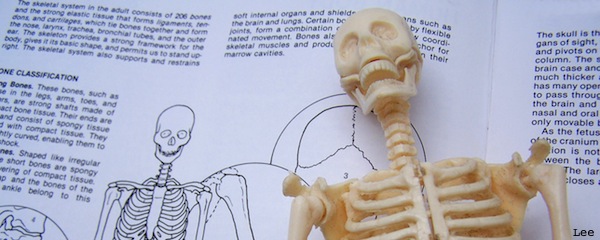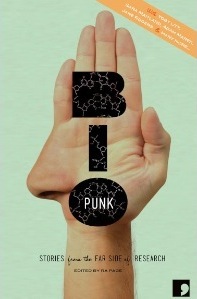
photo by Lee
We Recommend
Bio-Punk: Stories from the Far Side of Research
by Kirsty Walters
I’m not a fan of science. At school it was one of my least favourite subjects, spent at the back of the room playing with knives and drawing sketches in my book. Neither have I ever been a big thinker or theoriser about where scientific research could be leading us. I am a writer and as such tend to spend more of my time thinking about the unreal, the imaginary and yes, the impossible. And yet, Bio-Punk, with its collection of stories based around bio-medical research, captivated me. In fact, it opened my mind to a whole new way of thinking.
In ‘Xenopus Rose-Tinted’ by Annie Kirby, we are literally put into the mind of another animal. A frog, stolen from a lab and living with its abductor and her child. I love the subtlety of this story, how we slowly come to realise who the narrator is and the tale he has to tell about where he came from. And surprisingly for a frog, his insights into the family around him are, at times, remarkably poignant and very human:
Sophie is weary, I can tell, as though the coming day is already behind her, settling its weight into her shoulders. As Evie whirls, Sophie stares into space, not watching the sunset of scar tissue on Evie’s chest. The smoke obscures Sophie’s guilt.
I’ve never really thought about what happens to the animals abducted from labs, especially those that have already been altered or experimented on, and this story came as a pleasant surprise within the collection.
Another story I found rather memorable is one by Jane Feaver that looks at research into vaccines and the human trials run during the testing. In this instance the vaccine is for Malaria, a disease often talked and worried about in modern society. The narrator of ‘The Challenge’ is a woman who has decided to put herself forward for the trials, giving a real insight into what it would be like for those interested in doing so. But she is troubled by other aspects of the modern world – namely that her son is off fighting in Afghanistan:
Funnily enough ‘challenge’ is a word Mark used. ‘I need a challenge,’ he said, as if he had to persuade me. ‘I’m sick of being bored.’
I was pleased for him. I thought he’d reached a turning point; I thought, All will be well. I knew in my bones that he’d come round, if I could only let him be and didn’t nag. And he’d proved me right. But as soon as he went out to Afghan, from the morning he left, I wasn’t able to sit still. I felt useless.
As the story unravels we are left fearing for this woman’s mental and physical state, in turn believing her to be reckless and selfish, and at other times wanting to simply throw our arms around her and tell her  everything will be okay. Finishing on a cliff hanger our emotions are left unresolved and I found that this story has stuck in my mind ever since.
everything will be okay. Finishing on a cliff hanger our emotions are left unresolved and I found that this story has stuck in my mind ever since.
Possibly my favourite story in the collection is ‘Flesh and Blood’ by Simon Van Booy. In this story we’re taken into a world where, when coming of age, everyone is tested and issued a score which predicts when and in what manner they will die. The narrator of the tale has been told she will live a long time and die peacefully, but for her this has made life dull and lonely. In a kind of revolt against her score she begins ‘living dangerously’ and joins a website set up for people who are doomed to die in their thirties. When she finally comes clean and tells the man she meets she’s been lying about her score, she says, “I just wanted to meet people who valued life more.” A sad thought really – how would you look at your life if you knew you had 90 years left, or only 5? For some, this may seem like a great idea, but for me, the thought sends a shiver down my spine and makes me thankful that this is a question I am unlikely to ever know the answer to.
Other intriguing tales in the collection cover more areas of research, such as the idea of mind-reading and where it could lead to in Dilys Rose’s ‘Efemeri’. In this story brain scans are used to analyse people in an airport to see what they are thinking before they are allowed to board. In the heart-wrenching story ‘An Industrial Revolution’ by Adam Marek, a scientist uses her own gene pool to help in the breeding of rare animals, only to be told she can’t stay with them. And in ‘Anaka’s Factor’ by Sara Maitland, we follow a mother who is trying to explain to a teacher how she is in fact her daughter’s biological father. The teacher seems incapable of understanding and perhaps mirroring the closed-mindedness of much of today’s society .
Adding to the collection, each story is accompanied by an afterword, written by a scientist or ethicist who has been connected to the discussed subject, and who has helped the writer in their research. These afterwords add an extra depth to the stories and provide interesting background information to the areas of research explored. Although the collection would still make for an interesting read without these additions, I found that I was pulled in by these critical submissions and that sometimes they helped me to make sense of what I had just read.
This is an interesting idea for a collection of short stories that I would recommend to anyone with an open mind – who won’t be paranoid afterwards that the mad scientists of the world are going to turn us all into monkeys or read our minds every time we go through a metal detector. For me, Bio-Punk has definitely made me wonder what new findings are on the horizon and where we will be in fifty years’ time. Some of my theories are definitely more savoury than others, and I suspect more than a few will be finding their way into my own short stories soon.

